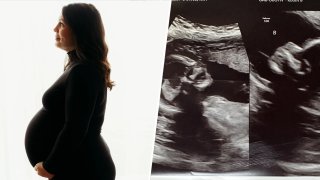
A woman in Alabama who was born with a rare double uterus is pregnant in both uteri.
WVTM, an NBC affiliate in Alabama, reported that Kelsey Hatcher and her husband, Caleb, are growing their family by two in a medical anomaly. The couple are already parents to three children, ages 7, 4 and 2.
Hatcher, who has two uteri that each have their own cervix, discovered she was pregnant in the spring. When she went in for her first ultrasound, she had some big news to share with her husband — not only was she expecting, but she was also pregnant in both of her uteri.
She recalled what she told him, explaining, “I said, ‘Well, there’s two of them in there.’ And he said, ‘You’re lying.’ I said, ‘No, I’m not.’’
Get Philly local news, weather forecasts, sports and entertainment stories to your inbox. Sign up for NBC Philadelphia newsletters.
Dr. Shweta Patel, an OB/GYN, told the affiliate that Hatcher’s pregnancy was “very, very rare,” adding, “some OB/GYNs go their whole careers without seeing anything like this.”
Due to Hatcher’s unique position, her pregnancy is considered high-risk.
“A double cervix or double uterus is way under 1%, maybe three per 1,000 women might have that,” Dr. Richard Davis, who specializes in high-risk pregnancies, explained. “And then the probability of you having a twin in each horn is really crazy.”
U.S. & World
Stories that affect your life across the U.S. and around the world.
While both of Hatcher’s daughter are growing normally, the difficult aspect of her pregnancy will come when they are born, whether that be together or separately.
“So when she goes into labor, if she does, then we will have to monitor each uterus and see which one’s contracting, and if they’re doing sort of almost the same or they’re different,” Davis said.
It is possible that her uteri will start contractions at different times, meaning that Hatcher’s daughters may be born apart, separated by just hours, days or even weeks.
As for whether her daughters are twins or just sisters, Patel said, “I think medically, this is such a rare thing that we don’t have a better way of describing it besides still calling them twins.”
This article first appeared on TODAY.com. More from TODAY:



